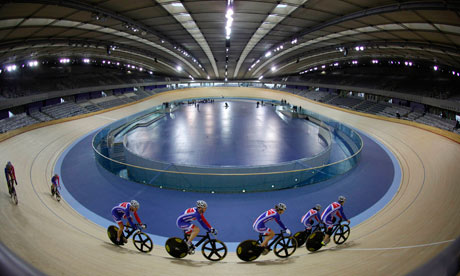BY JONATHAN REID
 What was once an industrial eyesore has become the site of the world’s first green Olympics – London 2012 wants to leave a legacy that influences the sustainability of future Games.
What was once an industrial eyesore has become the site of the world’s first green Olympics – London 2012 wants to leave a legacy that influences the sustainability of future Games.
“London 2012 is definitely the most sustainable Games so far, and it’s a significant step forward in terms of sustainability,” said Simon Lewis, 2012 programme manager at WWF-UK (World Wide Fund for Nature), a partner organization tasked with planning the sustainability of London 2012.
Lewis said that London 2012 organizers were able to significantly cut down on carbon emissions by minimizing construction and by employing a “zero to waste” landfill target.
“I think carbon emissions is the hugely important success of London 2012,” he said. “The thing that makes up almost 50 percent is the embodied carbon in construction of all the infrastructure. So knowing this right from the beginning, [it led] the way that London built or in many cases didn’t build venues.”
The few permanent venues constructed are architecturally stunning and sustainable. Well, mostly…
The Olympic Stadium was built with just a tenth of the amount of steel used to construct Beijing’s “Bird’s Nest” and also utilizes abandoned gas pipes. According to Lewis, the amount of carbon output of the stadium is an eighth of the “Bird’s Nest,” too. Both the lightest and most sustainable Olympic venue ever built, London 2012’s Olympic Stadium will be the focal point of the Games.
 Cyclists will ride inside the Velodrome, which was constructed with sustainably sourced Siberian timber and is half the weight of Beijing’s Velodrome.
Cyclists will ride inside the Velodrome, which was constructed with sustainably sourced Siberian timber and is half the weight of Beijing’s Velodrome.
The Aquatic Centre, however, lacks in sustainability compared to the other venues.
“It’s certainly an iconic design but it’s a very carbon intensive design,” Lewis said. “The sculptured roof of the aquatic center has a great deal of steel and so from a sustainability point of view, it’s not such a good outcome.”
While many venues and infrastructure in Beijing now sit derelict from the 2008 Games, the plan for London 2012 is to adapt the leftover infrastructure for other uses. Venues will either be disassembled or reduced in size. Thousands of homes that were constructed to house the athletes during the Games will be adapted for Londoners. Olympic Park will become one of the largest urban parks in Europe with restored wetland habitat complete with wildlife, and cleaned waterways of the River Lea.
“The hope is that this, over time, will become a new and exciting part of London, which is knitted into the framework of the city,” Lewis said. “A lot of thought has gone into making sure we haven’t built facilities where there is no clear use afterwards.”
London 2012 planners required contractors to use compostable packaging and sustainably sourced food. Lewis notes, however, that some Olympic sponsorships with corporations such as McDonalds meant a fast food diet wasn’t out of the question at Olympic Park.
“I think London 2012 has taken some very significant steps in the right direction, sort of using local, seasonal, organic food as much as possible,” he said.
Although Lewis feels that London 2012 will be a major stepping-stone for sustainability in the Olympics, he doesn’t agree with some of the sponsorships the Olympic Committee formed with corporations such as EDF, the second largest electricity company in the world, and British Petroleum (BP).
“I think one of the big hopes that WWF-UK had at the beginning, which we haven’t really seen delivered, certainly not yet, is a different kind of engagement with Olympic sponsors and the huge consumer base that they have,” he said. “We felt there was a real opportunity to engage sponsorships with a sustainability theme given London promised to be the greenest games ever, but I think in the face of some pretty tight economic times a lot of the sponsors have kind of reverted to business as usual.”
For future Games, however, Lewis is hopeful that the Olympics will be more sustainable…even if it’s not as quickly as we’d all hope.
“I think it’s evolutionary rather than revolutionary,” Lewis said.





